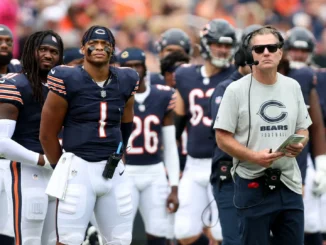
Leigh Matthews’ claim that the only accusation leveled at Chris Fagan in the Hawthorn racism scandal is that he ‘nodded his head once in a meeting’ suggests that Fagan’s involvement in the controversy is relatively minimal compared to other staff members at the club. Fagan, who was an assistant coach at Hawthorn during the period in question and is now the head coach of the Brisbane Lions, seems to be implicated in the scandal for his alleged passive response to racist incidents rather than active participation in discriminatory behavior.
The wider context of the racism scandal at Hawthorn includes horrifying accusations of systemic racism and mistreatment of Indigenous players, such as pressuring a player’s partner to have an abortion and advocating for the separation of Indigenous families. These allegations highlight deeply troubling issues within the club’s culture and management practices.
It’s crucial for organizations like Hawthorn to address such allegations seriously and take appropriate actions to ensure accountability and promote inclusivity and diversity within their ranks. The fallout from this scandal underscores the ongoing need for vigilance and efforts to combat racism and discrimination in sports and society as a whole.

The revelation that a former Federal Court judge found ‘no basis whatsoever’ to the claims in a report commissioned by the AFL adds a new dimension to the Hawthorn racism scandal. This finding challenges the veracity of the allegations raised in the report and raises questions about the accuracy and reliability of the initial investigation.
The fact that a respected legal authority has concluded that there is no substance to the claims suggests that there may have been misunderstandings, misinterpretations, or even potentially malicious intent behind the allegations. It’s crucial to approach such sensitive matters with careful scrutiny and ensure that all parties involved are given fair and impartial consideration.
However, it’s also important to acknowledge that the existence of this finding doesn’t negate the need for organizations like the AFL and clubs like Hawthorn to continue addressing issues of diversity, inclusion, and equity within their structures. Regardless of the outcome of this particular investigation, systemic racism remains a pervasive issue in society and sports, and ongoing efforts are necessary to create environments that are safe, respectful, and welcoming for all individuals.
Leigh Matthews’ passionate defense of Chris Fagan and criticism of the handling of the accusations surrounding the Hawthorn racism scandal sheds further light on the complexity of the situation. As someone with deep ties to both the Hawthorn Football Club and the Brisbane Lions, Matthews’ perspective carries significant weight in the football community.
His characterization of the handling of the accusations as ‘shambolic’ suggests a sense of frustration and disappointment with the process and outcome of the investigation. The failure of mediation between the club and players, particularly with the absence of a key player, further adds to the sense of discord and unresolved issues surrounding the matter.
Matthews’ comments highlight the emotional toll and impact that such controversies can have on individuals, clubs, and the broader football community. They also underscore the importance of transparent and fair processes in addressing allegations of racism and discrimination within sports organizations.
It’s evident that the Hawthorn racism scandal continues to spark debate and scrutiny within the football community, and the voices of individuals like Matthews contribute to the ongoing dialogue and efforts to address systemic issues and foster a more inclusive and respectful sporting culture.
Leigh Matthews’ assertion regarding the lack of confidentiality afforded to the accused compared to the accusers, coupled with his statement that Chris Fagan “never even got in the same room” and that the complaint against him amounts to him “nodding his head once in a meeting,” further emphasizes his frustration with how the accusations have been handled.
His remarks suggest a perception of imbalance in the treatment of both parties involved in the investigation, with the accused facing greater scrutiny and exposure compared to the accusers. This perceived lack of confidentiality and fairness in the process likely adds to the sense of injustice and dissatisfaction among those associated with the club, including Matthews himself.
The portrayal of Fagan’s alleged involvement as minor, with a simple nod in a meeting being the extent of the complaint against him, underscores the nuanced nature of the accusations and raises questions about the proportionality of the response.
Overall, Matthews’ comments reflect broader concerns about transparency, confidentiality, and due process in addressing allegations of racism and discrimination within the football community, highlighting the complexities and challenges inherent in such investigations.
The termination of the claim by former Hawks First Nations players and their partners by the Human Rights Commission, signaling the failure of mediation and the likelihood of the matter proceeding to court, adds another layer of complexity to the Hawthorn racism scandal.
The decision to terminate the claim suggests that attempts at reaching a resolution through mediation were unsuccessful, with the commission determining that the parties involved were unlikely to come to an agreement. This outcome underscores the challenges and complexities inherent in addressing allegations of racism and discrimination within sports organizations.
Hawthorn president Andy Gowers’ statement expressing a desire for a fair and swift resolution for all parties involved reflects the club’s commitment to addressing the issue in a transparent and equitable manner. However, the failure of mediation and the prospect of legal proceedings indicate that finding a resolution may be a lengthy and contentious process.
The ongoing dialogue and efforts to address systemic issues of racism and discrimination within the football community remain crucial, and the outcome of this case will undoubtedly have significant implications for the broader sporting landscape. It’s essential for all parties involved to continue working towards a resolution that promotes justice, accountability, and reconciliation.



Be the first to comment